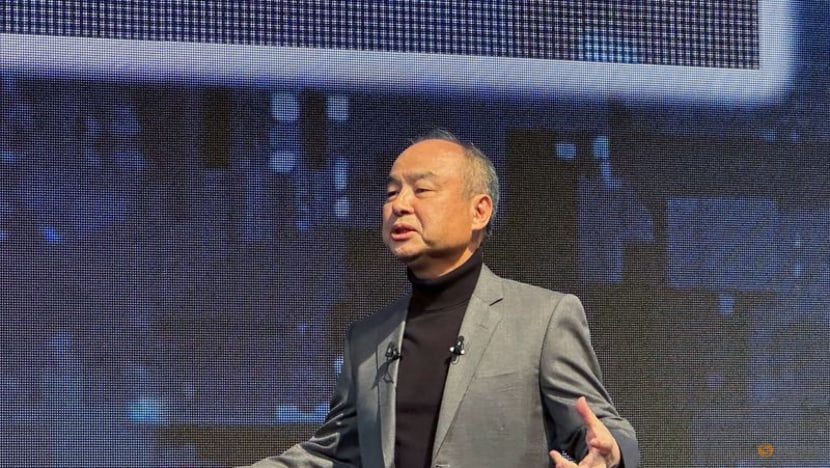Commentary: Softbank's Masayoshi Son is going big on OpenAI. Time to worry
The Japanese investor's foray into generative AI brings back memories of WeWork, says Shuli Ren of Bloomberg Opinion.

SoftBank CEO Masayoshi Son speaks at the SoftBank World 2023 corporate conference in Tokyo, Japan, Oct 4, 2023. REUTERS/Francis Tang/File Photo
HONG KONG: When Masayoshi Son bets big, it either marks the dawn of an era, or the dusk of a tech cycle.
The chairman of SoftBank has enjoyed some spectacular wins. Spotting Alibaba early handed SoftBank $58 billion when the Chinese e-commerce firm went public a decade ago. A US$32 billion take-private deal of ARM Holdings in 2016, followed by a timely listing of the chip designer in 2023 when the AI theme took off, gave Son another windfall. ARM now accounts for roughly half of SoftBank’s portfolio value.
But there were equally breathtaking failures. WeWork’s very public decline – a botched listing followed by bankruptcy filings – cost Son US$11.5 billion. The collapse of trade financing startup Greensill brought SoftBank to court.
India’s Oyo Hotels & Homes postponed its third attempt at an initial public offering after the Japanese investor wanted to see stronger earnings first. In the two years ending March 2023, his Vision Funds, the venture capital arm of SoftBank, incurred almost US$70 billion in losses.
So how should we read the tea leaves now that Son is “all in” on Sam Altman’s OpenAI? In April, SoftBank led a funding round that valued the unicorn at US$300 billion, promising to invest as much as US$30 billion by the end of the year.
PARALLELS WITH WEWORK
Call me overly cautious, but the SoftBank founder’s latest fascination feels eerily familiar, especially if we look back on the WeWork days. From Son’s funding pattern to the flawed income-liability mismatch inherent in the two unicorns’ business models, there are many parallels.
In both cases, SoftBank was late to the game, forcing Son to shell out billions of dollars to just sit at the table. WeWork had been fundraising since 2011, but the Japanese company did not come in until 2017, after the creation of the first US$100 billion Vision Fund.
Similarly, OpenAI’s record-breaking round this year was late-stage, which often limits a venture capital’s upside. This deal also raises concentration risk for the Japanese conglomerate. It would be SoftBank’s second-largest asset, after ARM, if Son invests the full amount. By the end of June, he had already put in US$9.7 billion.
A sharp jump in valuation in a short time is another common trait. SoftBank first took a WeWork stake in August 2017 at a US$21 billion valuation. Just over a year later, it put in another US$3 billion, more than doubling the valuation to US$45 billion.
Likewise, SoftBank is purchasing OpenAI shares in a secondary sale, which values the company at US$500 billion, nearly twice the price Son was spending about six months ago. Is Son overpaying?
Ultimately, both unicorns have given out rosy projections without going through a down cycle. WeWork failed in part because the COVID-19 pandemic changed how and where people work, thus diminishing office demand.
And one can only hope that generative AI is not disrupted by external forces, such as electricity shortages and an energy crisis, because OpenAI’s sky-high valuation relies on perfect operations. In its latest forecast, the startup said it expects to generate US$200 billion in sales in 2030, from only US$13 billion this year.
CASH BURN
And then there’s the cash burn. In late 2019, fearing WeWork would run out of money, SoftBank, which already held about one-third stake, had to offer the startup a rescue package.
Fast forward to 2025, there are nagging concerns about OpenAI’s cash flow, with the company projecting that it will churn through US$115 billion through 2029. How it plans to pay the US$300 billion cloud contract it has signed with Oracle is anyone’s guess. The deal will span over five years, starting in 2027, when OpenAI is expected to make just US$60 billion in sales according to the company’s optimistic outlook.
Both startups have fixed expenses but uncertain income streams. WeWork signed long-term leases but didn’t request commitments from its tenants. Similarly, OpenAI is on the hook to pay hundreds of billions of dollars over the next decade, while fickle consumers can cancel their subscriptions any time. This kind of business model means that VC money has to keep flowing, or the company runs into a liquidity crisis.
For now, Son is riding high. SoftBank’s shares hit a record last week after Oracle, one of its key artificial intelligence partners, disclosed almost half a trillion dollars of future contracts, with a sizeable contribution from OpenAI. But putting aside the euphoria for a minute, is this indeed good news for SoftBank, and can OpenAI ever achieve positive free cash flow with this kind of spending?
Once again, Son, late to the game, is staring into a bottomless pit.















